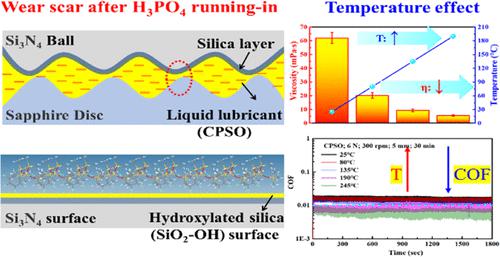Our official English website, www.x-mol.net, welcomes your
feedback! (Note: you will need to create a separate account there.)
High-Temperature Superlubricity Realized with Chlorinated-Phenyl and Methyl-Terminated Silicone Oil and Hydrogen-Ion Running-in
Langmuir ( IF 3.7 ) Pub Date : 2022-08-02 , DOI: 10.1021/acs.langmuir.2c01523 Xiangli Wen 1 , Pengpeng Bai 1 , Yonggang Meng 1 , Liran Ma 1 , Yu Tian 1
Langmuir ( IF 3.7 ) Pub Date : 2022-08-02 , DOI: 10.1021/acs.langmuir.2c01523 Xiangli Wen 1 , Pengpeng Bai 1 , Yonggang Meng 1 , Liran Ma 1 , Yu Tian 1
Affiliation

|
Ceramic friction pairs lubricated with chlorinated-phenyl and methyl-terminated silicone oil (CPSO) systems have potential applications in the aerospace industry. In this study, the effects of the running-in process and temperature on the lubricating performance of CPSO were investigated. The superlubricity of Si3N4/sapphire lubricated with CPSO was realized at >190 °C after H+-ion running-in. The mechanism of this high-temperature superlubricity was investigated by determining the stable adsorption configurations and adsorption energies of CPSO on different surfaces using density functional theory calculations. Compared with that on the Si3N4 surface, the adsorption capacity of CPSO on the hydroxylated SiO2 surface generated by H+-ion running-in increased, whereas the steric hindrance decreased. The viscosity–temperature curve of CPSO was measured, wherein the viscosity and pressure–viscosity coefficient of CPSO considerably decreased with increasing temperature, leading to high-temperature superlubricity in a wide speed/load range. This is the first paper to report oil-based superlubricity at temperatures of 190 °C, or even higher-temperature conditions. Furthermore, it provides guidance for the use of ceramic–CPSO systems in high-temperature conditions, including in the aerospace industry.
中文翻译:

用氯化苯基和甲基封端硅油和氢离子磨合实现高温超润滑
用氯化苯基和甲基封端硅油 (CPSO) 系统润滑的陶瓷摩擦副在航空航天工业中具有潜在的应用。在这项研究中,研究了磨合过程和温度对CPSO润滑性能的影响。CPSO润滑的Si 3 N 4 /蓝宝石的超润滑性在H +离子磨合后>190 ℃实现。通过使用密度泛函理论计算确定 CPSO 在不同表面上的稳定吸附构型和吸附能,研究了这种高温超润滑性的机理。与Si 3 N 4表面相比,CPSO对羟基化SiO的吸附能力H +离子磨合产生的2表面增加,而空间位阻减小。测量了 CPSO 的黏温曲线,其中 CPSO 的黏度和压力黏度系数随着温度的升高而显着降低,导致在较宽的速度/负载范围内具有高温超润滑性。这是第一篇在 190 °C 甚至更高温度条件下报告油基超润滑性的论文。此外,它还为在高温条件下使用陶瓷-CPSO 系统提供了指导,包括在航空航天工业中。
更新日期:2022-08-02
中文翻译:

用氯化苯基和甲基封端硅油和氢离子磨合实现高温超润滑
用氯化苯基和甲基封端硅油 (CPSO) 系统润滑的陶瓷摩擦副在航空航天工业中具有潜在的应用。在这项研究中,研究了磨合过程和温度对CPSO润滑性能的影响。CPSO润滑的Si 3 N 4 /蓝宝石的超润滑性在H +离子磨合后>190 ℃实现。通过使用密度泛函理论计算确定 CPSO 在不同表面上的稳定吸附构型和吸附能,研究了这种高温超润滑性的机理。与Si 3 N 4表面相比,CPSO对羟基化SiO的吸附能力H +离子磨合产生的2表面增加,而空间位阻减小。测量了 CPSO 的黏温曲线,其中 CPSO 的黏度和压力黏度系数随着温度的升高而显着降低,导致在较宽的速度/负载范围内具有高温超润滑性。这是第一篇在 190 °C 甚至更高温度条件下报告油基超润滑性的论文。此外,它还为在高温条件下使用陶瓷-CPSO 系统提供了指导,包括在航空航天工业中。











































 京公网安备 11010802027423号
京公网安备 11010802027423号